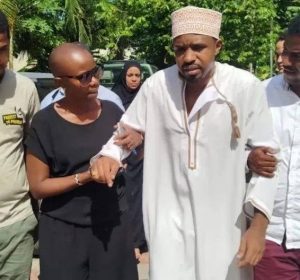Kenyan human rights activist Boniface Mwangi has returned home after enduring four days of severe torture while in Tanzanian custody. He appeared frail and struggled to walk as he shared his traumatic experience with journalists at Moi International Airport in Mombasa on Thursday evening. Speaking from a wheelchair, Mwangi expressed his distress and called for prayers for a fellow detainee who remains missing.
Mwangi recounted his harrowing experience, stating that he had endured four agonizing days of torture, leaving him barely able to walk. His voice shook as medical staff prepared to airlift him to Nairobi for urgent care. The activist had been arrested in Dar es Salaam earlier in the week while trying to attend a court hearing for Tanzanian opposition leader Tundu Lissu, who is facing treason charges. Mwangi was detained alongside Ugandan lawyer and journalist Agather Atuhaire, whose current location remains unknown.
Mwangi expressed deep worry for Agather, recalling their shared experience of torture and the horrific acts they endured together. His concern for her safety was palpable, and he urged others to pray for her well-being. The troubling events began on Monday when Mwangi shared a video on social media, capturing a tense encounter with suspected Tanzanian officers outside his hotel room. In the video, he recounted how he refused to open the door to men who did not present proper identification.
Mwangi expressed his fears about living in a country plagued by abductions, executions, and the imprisonment of those opposing President Samia Suluhu Hassan’s regime. Despite taking precautions, he was arrested and held without communication for four days before being forcibly deported to the Kenyan border. Tanzanian authorities left him at the Horohoro border post, from where he traveled to Lunga Lunga and eventually reached Ukunda in Kwale County.
Muslim for Human Rights activist Khelef Khalifa, who picked up Mwangi at the border, described the activist’s condition as deeply concerning.
“He was badly beaten on his legs; he could barely walk. Torture is against the law. Can Tanzania tell us why they detained him? This is a violation of human rights,” Khalifa said.

Boniface Mwangi being helped by his wife to walk.
Videos shared by Haki Africa Executive Director Hussein Khalid showed Mwangi being wheeled through the airport, highlighting the severity of his physical condition. Medical personnel in Diani, where he was first taken for assessment, noted visible injuries and weakness.
Mwangi’s wife, Njeri, who rushed to be by his side, made an emotional plea to journalists to allow her husband to receive immediate medical attention.
“No questions… Please, no. He has already said he was tortured. I know this is important and you want a lot of information, but I beg you to please let him go home. He needs medical attention… he has told you himself he was wounded; they tortured him,” she said.
The activist’s detention sparked widespread condemnation from human rights organizations across East Africa and mounting diplomatic pressure. Prime Cabinet Secretary and Foreign Affairs CS Musalia Mudavadi confirmed Mwangi’s release following public outcry and threats of protests outside the Tanzanian High Commission in Nairobi.
Hussein Khalid of Haki Africa condemned the Tanzanian government’s treatment of the Kenyan citizen, warning of international intervention if justice is not served.
“They were brutal and we will not take this thing lightly. If the Kenyan government is complicit we will involve the international community to seek redress,” Khalid stated.
The Kenya National Commission on Human Rights confirmed receiving Mwangi in Kwale County and coordinating his transfer to Nairobi for comprehensive medical evaluation. The full extent of his injuries remains to be determined by doctors in the capital.
Despite his ordeal, Mwangi expressed gratitude to Kenyans who advocated for his release.
“Thank you to everyone who spoke and stood with us; the solidarity was not in vain,” he said before being airlifted to Nairobi.
The incident has strained diplomatic relations between Kenya and Tanzania, with questions being raised about the treatment of East African citizens across borders. As Mwangi begins his recovery, concerns remain for Agather Atuhaire, whose fate continues to be unknown.
The activist’s case highlights growing tensions in Tanzania over human rights and political freedoms under President Suluhu’s administration, as opposition voices face increasing pressure and persecution.
